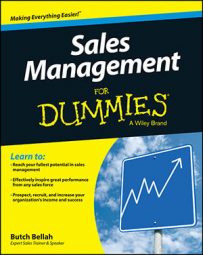In your position as sales manager you will be asked from time-to-time to produce a sales forecast for the coming year or financial period. Even though a forecast is all subjective, the more accurately you can predict your future sales the more valuable the information is to others making decisions within your company.
It's not a coincidence that it's referred to as forecasting because it's like predicting the weather — you rely on past history, current data, and future assumptions to arrive at your forecast figure.
Many tools can help you more accurately forecast your future sales, but a lot of forecasting comes down to knowing your company, your product, and your market. When preparing a sales forecast start by asking yourself several questions:
Where are you today? What are your current sales compared to the prior year (or financial period)? You must know where you're starting in order to provide even an educated guess at where you're going.
What market changes are likely to affect your sales? What outside forces could cause a sales increase or decrease based on your geographic market or the market segment you're servicing? If you sell to homeowners in an area where 250 new homes are expected to be completed in the coming year, you need to factor that into your equation. What percentage of the business will you get?
What product changes are likely to affect your sales? Is there a new model being introduced that gives you a competitive advantage? Or, perhaps a competitor is introducing a new model that gives it an advantage — you need to plan for that as well.
What pricing policies can affect your sales? Will you experience a price increase that will artificially increase sales or impact purchases?
What personnel changes may affect your sales? Are you adding a new territory or consolidating two into one? Is one of your top representatives retiring or moving to another position? How will your people affect your future sales?
What regulations affect your sales? Are tax changes or other government regulations set to either go into effect or expire within your forecast period? Will they be positive or negative for your industry?
What other changes are on the horizon? Are you going to add or lose a significant customer that will impact sales volume? What other factors — inside and outside your control — are likely to have an impact on your sales during the coming year?
Take time to consider all these factors and more. Anything that could possibly affect your sales, your sales team, your market, your company, or your product should be taken into account. It's tedious and sometimes mind-numbing work, but it has to be done — and the forecast needs to be as accurate as you can possibly get it.
Take each month separately and calculate the number of sales days within that particular month. If you know what volume you expect from your salesperson, you can then calculate average sales per day. Then simply multiply that by the number of sales days in the month. Here is a sample monthly forecast for an imaginary company.

You need to consider all these things and more when creating a professional sales forecast. Begin with each salesperson's sales each month and put the time and energy into accurately forecasting their production.
If your business is seasonal, you must factor that in, as well.

